With Qatar’s winter season in full swing, the wilderness becomes a popular place to escape city life and retreat to star-lit skies and toasty campfires.
Whether you want to swim in the sea or explore sandy dunes, there’s something to suit everyone’s taste of adventure in Qatar’s deserts. 365 Adventures is a tourism company whose aim is to show tourists and residents Qatar’s Inland Sea (Khor Al Adaid) – one of the few locations in the world where the sea meets the desert sand.
Down in the Inland Sea dune bashing in Qatar takes place, a popular adrenaline-filled activity for locals and tourists alike.
Once reaching the dunes, SUV tires are deflated to the right level, which allows cars to glide up and down the waves of sand with ease. Once in the dunes you can have an experience like no other, winding through the dunes like a roller coaster.

At Sealine Beach, 365 Adventures provides dune bashing with experienced desert drivers, well-maintained cars, and an experience to suit everyone’s tailored level of thrill. Whether a resident or visitor of Qatar, a trip to the vast desert is a must to free your adventurous side and experience what Qatar’s nature and culture have to offer.
The day in the desert typically moves from dune bashing to a beach-front camp. Whether you prefer a glamorous style of camping or an authentic and rustic Bedouin experience, 365 Adventures provides safaris to suit your taste.
Ending your night in the desert, you can sit under the stars, enjoy an authentic BBQ and tell stories by the fire.
Over the past few weeks, larger-than-life murals have been springing up throughout Qatar.
With the goal being to bring art to Doha’s streets, Qatar Museums established JedariArt – a public art initiative inviting seventeen artists to paint murals across the city.
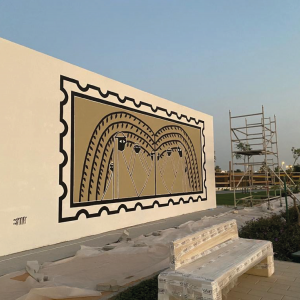
As artists painted their works of art, they asked themselves how can our artwork speak to the community? Using cultural motifs in a contemporary setting, JedariArt prioritised murals that added meaning to the neighbourhoods they were painted in.
One such artwork is located at the Post Office Park by Qatari artist, Maryam Al Maadhadi. Reflecting the location, the mural represents a postal stamp that features historic elements from across Qatar, such as the palm tree, pottery from Al Zubarah, and war arrows from Dukhan.
“What inspired me to create this artwork is our culture and nature in Qatar, to highlight how we live in Qatar and how we are proud of our historical heritage,” Maryam said.
Another featured artist is Abdulaziz Yousef, whose two murals showcase figures of modern Qataris. His mural at the Msheireb Metro Station is likened to a ‘family reunion’ as it brings together people from all walks of life. The artist noted that, “My inspiration is expressing elements of the Qatari community and share our values and culture using my modern illustration style.”
Other murals had uplifting messages embedded within their colourful designs. Dimitrije Bugarski’s mural at the Doha Fire Station, titled “Head Above Water,” is a colourful abstract piece that “shows even when we think we are ‘drowning’ we can always find the way out”.
These new additions complement the vibrant architecture and outdoor spaces throughout Doha, providing new reference points for people to explore the city.
“Unwasted” is an environmental initiative led by a group of local designers, playing with the idea of what ‘art’ means in order to encourage action and change.
Located at the M7, an incubator dedicated to empowering fashion and design creatives, the exhibition highlights the importance of sustainable, waste-free designs that “reduce, reuse and recycle”, raising awareness about waste in the fashion industry and its threat to the environment.
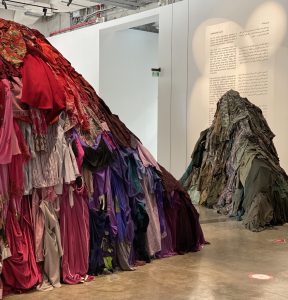
From a mound of eye-catching clothes to the display of hand-crafted pieces, everything in the exhibition integrates recycled materials such as furniture, accessories and clothing. It is the first project in Doha to receive an ‘Eco-Event Level-II’ award from the Qatar Green Building Council.
Alongside raising public awareness, the “Unwasted” exhibition is encouraging local cafes to integrate biodegradable methods into their product packaging. It is also hosting workshops and film screenings in collaboration with partner institutions, including the Doha Film Institute and the Qatar Foundation’s ‘Qatar Reads’ campaign.
Initiatives empowered by creativity and sustainability have been rapidly emerging in Qatar by its creative minds. The “Unwasted” exhibition not only sheds light on the issue of waste in the fashion industry, but also engages the public by presenting the issue in unique ways to encourage action.
Qatar Music Academy (QMA), a member of Qatar Foundation, is the first music academy in the country. With the goal to train the next generation of world-class musicians in the region, Q Life spoke to Taoufik Mirkhan, the Head of the Arabic Music Department.
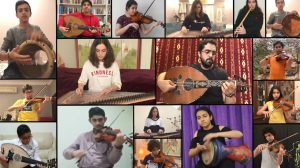
Can you tell us a little bit about the Arabic Music Department?
The Arabic Music Department at QMA offers comprehensive education on Traditional Arabic instruments such as the Oud, Ganun, Nay, Kaman, and Arabic percussion. We also offer ensemble group classes including Takht, the traditional Arabic ensemble, and Jawqa, meaning Arabic choir. Through these programmes, we offer our students the chance to explore the theory, practice, and history of maqam music, allowing us to preserve the legacy of Arabian music culture.
In addition to teaching students how to play instruments, you also cover music history, theory, and analysis through the ‘Maqamat’ course. Why is this important for students?
The course teaches oral techniques and the maqam system which lie as the crucial foundation of traditional Arabic music.
How are you merging Qatari musical traditions in your department?
Students in QMA learn the unique Qatari iqa‘at (rhythmic cycles) in addition to Qatari folkloric songs. We make sure to have a yearly collaboration between Qatari musicians & QMA students by organising recitals and workshops together.
Why is it important to preserve Arabic musical heritage and carry the practice to the next generation?
All over the world, the cultural heritage of a nation is held with great importance. Teaching the framework of Arabic and Qatari music affirms the identity of some of our students in a unique method that can preserve it for generations to come.
What have been some memorable experiences with students in the Arabic Music Department?
We held a performance during the Gala Concert of the 10th anniversary of the Qatar Philharmonic Orchestra for Her Highness Sheikha Moza bint Nasser. We have also performed for Prince Charles, Prince of Wales, and the Duchess of Cornwall.
Lastly, we participate with other entities during the celebration of Qatar National Day.
How is QMA spreading Arabic Music appreciation to the wider community in Qatar?
Students at QMA perform regular performances and collaborate with many national organisations. We also arrange a yearly educational activity for international and independent schools within Qatar to encourage talented students to enroll in our Academy.
Additionally, we launched a course “Certificate in the Fundamentals of Music Therapy” with collaboration with Weill Cornell Medicine-Qatar, giving the learners an overview on how to use music therapy to treat a variety of conditions, including anxiety, depression, autism, Alzheimer.
QMA is also a Qatar Foundation Youth Ambassador and promotes unity through the common language of music, regardless of nationality, religion, or status. One of our future goals is to integrate a specially designed music program into Qatar Foundation schools.
Saad Ismail Al Jassim is unlike any other shopkeeper at Souq Waqif. As one of Qatar’s last living pearl divers – who went on to become a body builder, entertainer, and poet – Saad has dazzling anecdotes to share with his customers.
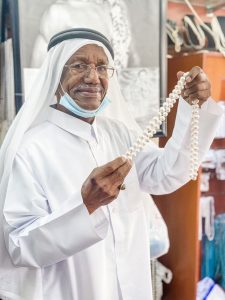
Becoming a pearl diver at 18, Saad would spend months at sea, going into the water at the break of dawn and emerging at sunset. His only companions on these dives were a weight to hold him down, a basket to collect the oysters, and a nose clip to keep out the water.
Despite the formidable conditions of traditional pearl diving, Saad still looks back fondly on his time at sea. He describes those on the boat with him as family, always coming together to pray, eat and help each other on dives.
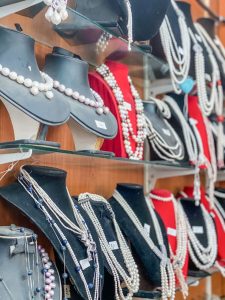
Pearl diving was a major cornerstone of Qatar’s economy before the discovery of oil. With traders coming from India, France and Italy, Qatar was a hub for freshwater pearls. Nowadays, pearl diving is a cherished aspect of Qatari heritage.
Saad’s passion for pearl diving pushed him to open a pearls shop in Souq Waqif. From diving for days to find a pearl in his youth, Saad is now surrounded by pearls in his shop. With great pride, Saad shows off memorabilia of his past adventures for all to revel at. The basket he used to collect oysters in still hangs from the roof of his shop, while the weight that pulled him deep into the sea sits in the corner.
His natural love to perform attracted Saad to bodybuilding. Earning the title of ‘Pahlwan’, which translates to ‘Strong Man’, Saad stunned audiences by accomplishing feats such as resting on nails and lying on a bed of glass.
Known around Qatar as one of the last of the pearl divers of a bygone era, Saad has maintained a strong passion for life even at his old age. The classical Qatari music blaring out of his shop, delighting both customers and neighbouring shopkeepers alike, shows just that.
Driving beside Doha’s bay, traditional Dhows sail along Qatar’s colourful skyline. These Dhows, a common name for Qatar’s traditional sailing vessels, were historically used to transport fruit, fresh water, pearls and other valuables around the region’s coasts and across to Asia.
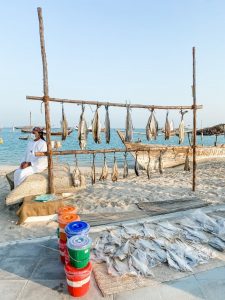
The Katara Dhow Festival showcases dozens of these beautifully crafted vessels. This year’s 10th anniversary celebrates the long history behind the Dhow and Qatar’s sea-faring traditions, holding a variety of activities that emphasise the significance of Qatar’s ancestral legacy and preserve Qatar’s folk heritage.
During the festival, participants set up their stalls along Katara’s beach showcasing their various specialties, ranging from net weaving, carpentry, handicrafts, and oyster-opening using traditional tools and equipment. Further into the water, visitors are lucky enough to view traditional Dhows sailing in real time, as demonstrations take place.
Between the stalls, you can find people from other nations taking part to present and educate others of their own traditions. Participating from countries such as Iraq, Kuwait, Oman, and Zanzibar, visitors learn everything from cooking to traditional handicrafts. By highlighting ancient connections with other countries, visitors are able to understand how culture, and trade, can bring nations together.
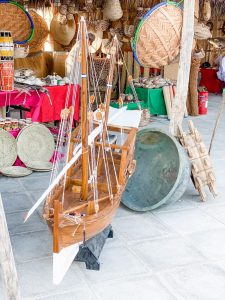
Over the days of the festival, Omani folk bands and Qatari storytellers perform in front of large audiences, immersing them in not only Qatar’s culture, but the region’s.
For Qatar, folklore remains a priority for preservation, and events like these serve as a way to travel back in time and partake in history itself.
Fatma Shadad, a beloved Qatari folklore artist known for founding the country’s first all-female band, sadly passed away recently. Fatma was an early pioneer in the Qatar arts scene, who went on to become a well-loved voice in Qatari theatre and radio.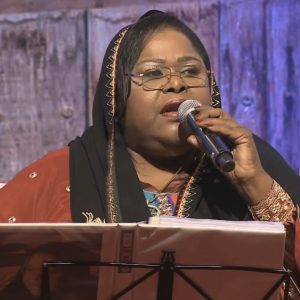 Growing up surrounded by music, Fatma admired how the community came together to listen to her father’s local band. She was greatly inspired by these performances, and became determined to follow in her father’s footsteps and one day form her own band.
Growing up surrounded by music, Fatma admired how the community came together to listen to her father’s local band. She was greatly inspired by these performances, and became determined to follow in her father’s footsteps and one day form her own band.
Despite the challenges and obstacles she faced on the way, Fatma formed her all-female band in 1996. She quickly became one of Qatar’s most iconic singers, touring the country with her band and delighting audiences with her renditions of traditional Qatari music. Throughout her career, Fatma offered many opportunities to aspiring female musicians, becoming a mentor and a role model to countless artists.
One of Fatma’s most popular songs is “Gharby Hawakom Ya Ahl el Doha”, reflecting on her love and devotion to Qatar and its people. It has been covered by many folk artists in the region, and has become synonymous with national pride and celebrations.
Fatma’s lifelong mission was to preserve folk music for future generations and share its beauty with the world. Her legacy continues in her band, while her invaluable contributions to Qatari folk music will be greatly cherished by all in Qatar.
Jassim Abdulaziz was a much-loved journalist and media personality in Qatar, who sadly passed away recently following a brief illness. With a media career spanning close to forty years, Jassim was a regular on Qatari television screens and enjoyed a great following from Qatari and Gulf audiences.
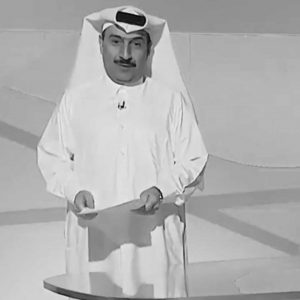
Jassim began his media legacy in 1983, working as a presenter of the news, as well as arts, culture, and sports broadcasting. One of his most popular programs was the game show ‘Emrah wa Erbah’.
National Day celebrations in Qatar were not complete without Jassim’s commentary on local television, as he soon became a familiar and welcome voice for audiences. The same can be said for his show ‘Night of Eid’, where he would bring together acclaimed Qatari artists and celebrities to celebrate the special occasion.
Those who knew him personally knew of his passion for nurturing young minds who aspired for a career in media. He would dedicate hours of his time guiding, teaching, and mentoring them to become better journalists. Jassim was always eager to support the future generation of Qatari media personalities.
Truly a media pioneer in Qatar, his success had a trailblazing effect on the industry, as he became an inspiration and role model to the many who followed in his footsteps. His loss is felt across the country, but his memory and positive influence will be forever cherished.
The Supreme Committee for Delivery & Legacy is committed to making FIFA World Cup Qatar 2022 the most accessible and inclusive edition in the tournament’s history. These people-focused values are reflected in the sensory rooms at Al Janoub Stadium and Khalifa International Stadium, designed to provide calming environments for those with special needs during noisy and crowded matchdays.
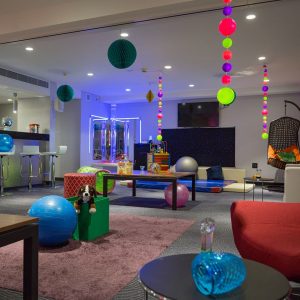
These rooms were designed in partnership with the Ontario Centre for Special Education (OCSE), which proudly supports efforts to build facilities that support the development of an inclusive and aware society.
Mariam Al Rashdi, founder of the OCSE, was inspired by the work of the Supreme Committee’s Accessibility Forum and was moved to donate resources from the OCSE’s sensory room for the pilot project at the Khalifa International Stadium.
“An environment was required which can help those with additional needs to cope with the excitement and stimulation happening at a football game,” she said. “This sensory room was never a FIFA requirement; it was Qatar saying that we have thought about people with cognitive disabilities who require extra support to watch football.”
These sensory rooms are fitted with an array of calming equipment, including bubble tubes, beanbags, ball pens and ceiling projections, as well as soft furnishings, mood lighting and noise-cancellation technology. These features allow for those with disabilities, as well as their families and friends, to enjoy football matches in a welcoming, inclusive and calming environment.
These rooms are just one of the initiatives in place to cater for people with both physical disabilities and cognitive disabilities. The Supreme Committee and its stakeholders are committed to prioritising and championing accessibility in 2022, and beyond.
Abdulla Al-Tamimi had the tough choice of choosing between his love for both football and squash before setting his heart on a professional squash career. Playing since he was just seven years old, Abdulla is now Qatar’s top-ranked squash player and number 30 in the world number. His career has evolved and grown enormously during this time, fuelled by his endless determination.
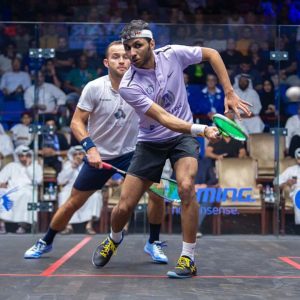
Joining the Aspire Academy in 2006, Abdulla received invaluable mentoring which went far beyond sport. “Until I was 17, I couldn’t speak a sentence in English, so there’s been a lot of improvement in this area! I received a great education in all areas of life, and they also took me to the next level in squash. I really see Aspire as my second home”.
Abdulla has compiled an impressive trophy cabinet through his junior and professional career, including winning numerous Professional Squash Association Tour Championships. “Some of my biggest achievements have been the Malaysian Open and Australian Open, as well as the championships held in Qatar”.
However, in 2019, Abdulla underwent a challenging surgery for compartment syndrome in both legs, which was devastating news for the professional athlete; “I had to stop playing for five months and my ranking dropped from 23 to 58. But I recovered, and fought hard to reach 27 again”.
Abdulla did not let this potential setback stand in the way of his dreams, and he has continued to be driven despite the challenges posed by COVID-19. “We had to remain motivated to prepare for the next upcoming event”.
“I have a lot of goals. I want to be top ten in the world and win gold for Qatar at the Asian Games. If I keep working on my mental and physical strength, I believe I have the skills to do it. My time will come and I will achieve it”.
With a strong mindset and boundless aspirations, Abdulla’s career will be sure to go on from strength to strength.